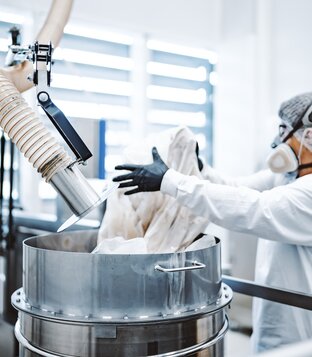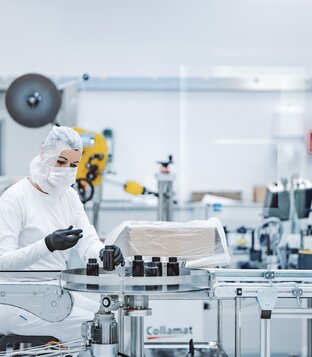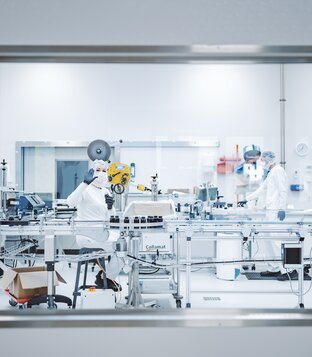DoloZym® forte Gold
DoloZym® forte - Proteolytic enzymes for systemic absorption
Enzymes control and accelerate countless metabolic processes in the body. They contribute above all to the fact that substances are cleaved and thus better processed, and are thus constantly occupied with the degradation of large molecules. Bromelain, papain, trypsin and chymotrypsin have long been the focus of science as representatives of this important molecule class. These four enzymes contained in Biogena DoloZym® forte have proteolytic properties, i.e. they break down proteins. Bromelain and papain are obtained exclusively from vegetable sources - while papain is contained in particularly high concentrations in the skin of the green papaya, bromelain is mainly found in pineapples.
Biogena DoloZym® forte contains not only vegetable bromelain and papain but also the important enzymes trypsin and chymotrypsin. In addition, natural bioflavonoids such as quercetin and citrus bioflavonoids as well as grape extract supplement the sophisticated enzyme complex - the combination of special micronutrients contained in Biogena DoloZym® forte thus represents a sensible supplement to the daily diet.
DoloZym® forte
• Contains the proteolytic enzymes trypsin and chymotrypsin
• With the purely vegetable, protein-splitting enzymes bromelain and papain
• With valuable citrus bioflavonoids, quercetin and grape extract
Enzymes have a slightly blood-thinning effect. Therefore, they should be discontinued at least one day before a planned operation. As soon as haemostasis is assured after the operation, the patient can start taking the enzymes again. Consult your doctor.
Enzyme activity:
Bromelain: 6 FIP-E/mg
Papain: 60000 USP-E/mg
Trypsin/Chymotrypsin: 1400 USP-E/mg (= Trypsin 2400 USP-E/mg + Chymotrypsin 400 USP-E/mg)
Chymotrypsin: 1000 USP-E/mg
Not an organic product according to VO (EU) 2018/848.
Suitable for diabetics. The information provided here is not a statement on healing or a recommendation to self-medicate. DRcaps® Plus is a trademark of Lonza or its affiliates, registered in the USA. Subject to print or typographical errors. Version 12.05.2023.
Store in a dark, dry place at room temperature. Protect from heat. Keep out of reach of children.
High proportion of natural ingredients
Well tolerated
Produced according to the pure substance principle
Optimal absorption
Support during increased load
Recommended consumption
1 x 3 capsules daily on an empty stomach (30–60 minutes before a meal) or at the earliest 2 hours after a meal with plenty of liquid.
Food supplement: The recommended daily dosage should not be exceeded. No substitute for a balanced and varied diet and a healthy lifestyle.Package size
90 capsules (1 month supply), 59 g
Potential applications
• For the increased supply of the proteolytic enzymes bromelain, papain, trypsin and chymotrypsin.
• For the supplementary supply of natural bioflavonoids
Ingredients | per capsule | daily dose 3 capsules | % NRV* |
| Bromelain | 100mg | 300 mg | - |
| Papain | 100mg | 300 mg | - |
| Trypsin-chymotrypsin | 50mg | 150 mg | - |
| Chymotrypsin | 1.6mg | 5 mg | - |
| Quercetin | 100mg | 300 mg | - |
| Citrus bioflavonoids | 60mg | 180 mg | - |
| Grape extract | 10mg | 30 mg | - |
Ingredients
Capsule shell (hydroxypropyl methyl cellulose, gelling agent: gellan gum), bulking agent: powdered cellulose, quercetin, bioflavonoid-containing citrus extract, bromelain, papain (contains sulfites), trypsin-chymotrypsin, grape extract, chymotrypsin (contains milk).

100% Clean Label - without hidden additives = pure substance principle
BIOGENA is committed to transparency, honesty and responsibility, far beyond the legally required full declaration of all ingredients. We focus on 100% quality with the pure substance principle. All our micronutrient preparations are guaranteed to be pure and free from colourings, preservatives and technical additives. This leads to maximum tolerability (currently 97%) and active recommendation (currently 95%) by over 18,000 doctors and therapists and over half a million customers.



What sets us apart
We want to create, share and increase knowledge and infect others with our enthusiasm for health. At the same time, the responsible treatment of our environment is a matter close to our hearts.
Production of our premium preparations
When it comes to quality assurance, we at BIOGENA make no compromises. In the production of our micronutrient preparations, we always pay attention to the highest standards - for complete traceability and a fully transparent value chain: from raw material sourcing and product development through studies and application monitoring to state-of-the-art in-house production, logistics and shipping to over 60 countries around the world.
- Careful in-house production to a unique manufacturing standard at BIOGENA Good Health World in Koppl near Salzburg, including show production
- High-quality and sustainable branded raw materials labelled with test and quality seals
- Each individual batch undergoes the strictest quality tests by the German LEFO Institute Dr Wichmann, where experts independently assess parameters such as impurities, pesticides and heavy metals
- Certified according to FSSC—a globally recognized seal of quality for the highest food safety standards, GMP—Good Manufacturing Practice, Organic certification, Halal certification, Kosher certification
- Use of the purest capsule shells in the world: Vcaps® Plus and DRcaps® are purely plant-based capsule shells made from hydroxypropyl methylcellulose and nothing else
FAQ
When it comes to proteolytic enzymes, DoloZym® forte GOLD is our premium product. It combines bromelain, papain, trypsin and chymotrypsin – supplemented with bioflavonoids and zinc, which contributes to cell division. A well-thought-out combination for phases in which your body needs support for regeneration.
Proteolytic enzymes such as bromelain, papain, trypsin and chymotrypsin can be found in pharmacies, specialist shops or online. It is important to look for certified quality and a clear, transparent composition – so you know exactly what you are putting into your body. BIOGENA stands for pure raw materials and carefully developed formulas that you can rely on.
Not quite. Many digestive enzymes are proteolytic enzymes, but not all proteolytic enzymes work only in the digestive tract. Some also support metabolic processes outside of digestion, such as tissue regeneration.
Proteolytic enzymes are generally considered to be well tolerated. However, it is important to note that if you have certain pre-existing conditions or are taking blood-thinning medication, you should consult your doctor before taking them. This is the safest course of action.
DoloZym® forte GOLD contains milk ingredients and is therefore not lactose-free. If you are sensitive to lactose, it is best to consult your doctor or therapist before taking it.
Although DoloZym® forte Gold has a plant-based capsule shell, some of the enzymes it contains – trypsin and chymotrypsin – come from animal sources. This means that the product is neither vegan nor vegetarian.
At Biogena, “pure substance principle” means that we do not use technological additives which are used for the fully automated manufacturing of tablets, capsules and pills (e.g. anticaking or release agents and so forth) or additives that are used for optical reasons or for enhancing the taste of the products (artificial aroma, colouring agents, coatings etc.). Due to a semi-automatic manufacturing process, we can avoid these substances that often have a higher proportion in customary products than the actual active ingredients. In the case of nutritional supplements, additives have to be indicated in the list of ingredients. Here, the patient or customer can get useful information. Concerning the single ingredients, we also care for our raw materials to be free of carrier substances. In cases where this is not possible, we use natural food components such as maltodextrin, cellulose powder or calcium carbonate. The majority of our ingredients is produced exclusively for us – free of carrier substances (e.g. our enzymes our probiotics: other manufacturers often use lactose as a carrier – the product batches produced for us are explicitly without carriers).
BIOGENA cooperates with respected physicians and therapists in many different countries. With them, you are in good hands. You can also buy our products from our Biogena stores in Austria (Vienna, Linz, Salzburg, Graz, Natternbach), Germany (Freilassing, Frankfurt, Munich, Hamburg) and soon in London (UK) as well as online at www.biogena.com.
BIOGENA preparations are carefully manufactured in our own production facility, BIOGENA Good Health World (Salzburg, Austria), to a unique manufacturing standard. We are certified according to ISO 22,000:2018 and GMP - Good Manufacturing Practice and have organic, halal and kosher certification. The quality-tested raw materials come from premium brand raw material manufacturers - sourced directly from the world market leaders.
















